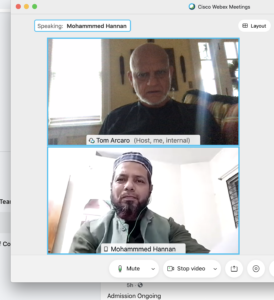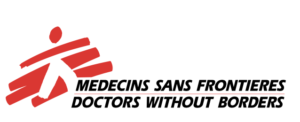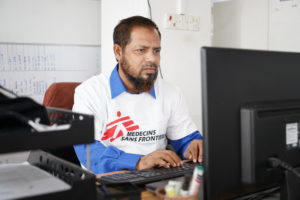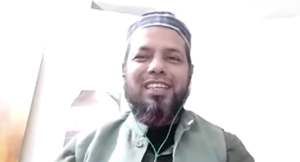Doctors Without Borders (MSF) is active in Cox’s Bazar and in the US
Covid-19 continues to impact all our lives, unevenly so, with those historically on the margins being hit the worse. Many who live in poverty are often forced to make a choice between working wherever they are able and thus risking infection or isolating, staying safe from the virus only to face starvation. MSF, active in nations around the world, has been responding to the coronavirus health needs of millions, including those affected in the United States.
Talking with Hannan in Bangladesh
Muhammed Hannan and I have talked many times over the last year or so, mostly about the MSF response to COVID-19 in Bangladesh where he works as a Personnel Administration Manager for Doctors Without Borders (MSF).1 Based in the capital city of Dhaka, Hannan lives with his family. Thankfully, he and his family have remained free of the virus.
virus.
We first talked about the COVID-19 outbreak back in April when the numbers were just beginning to rise. As the COVID-19 pandemic has gotten worse, Hannan and I have talked frequently, and he regularly asks about how I am doing, admonishing me to ‘be careful’ and to always take precautions. Indeed, in my semi-rural North Carolina county the numbers are quite dramatic. With a population of just 160,000 we have had 15,000 cases and over 200 deaths, and the numbers are only now beginning rend slowly downward. The first vaccines have arrived at our local medical center, so there is now a dim glimmer of light at the end of the tunnel. I am one of the lucky ones having received the first of two vaccinations, my second coming in a couple weeks.
The overall numbers in the US may not have yet reached their peak in this current massive second wave of infections. According to the most recent data collected by Johns Hopkins University there have been over 108 million cases globally with the US accounting for nearly a quarter of all cases with well over 27 million infections. By contrast Bangladesh has ‘only’ 540,000 cases. Some quick mental math leads me to the fact that with about half the population of the US, Bangladesh has proportionately far fewer cases. The US infection rate (population/number of infections per 1 million) is 56,291 compared to 3,262 in Bangladesh, 28 times higher than in the US. This is an astounding contrast, even accounting for the lower percentage of individuals being tested there. No wonder Hannan worries about my health and safety.
MSF in the US
Nearly a year ago in April 2020 MSF began operations in the US. Here is their public statement:
“In response to the unprecedented challenges presented by the COVID-19 pandemic, Doctors Without Borders/Médecins Sans Frontières (MSF) began working in key sites across the United States to reach vulnerable groups that often lack access to health care. We ran limited operations in the US between April and  October and have now concluded these activities.
October and have now concluded these activities.
MSF teams collaborated with local authorities and community-based organizations on a wide range of projects, including work with people who are homeless or housing insecure in New York; migrant farmworkers in Florida; Native American communities in the Navajo Nation and Pueblos; and neglected and marginalized communities in Puerto Rico. Our teams also worked with staff in nursing homes and long-term care facilities in Michigan and Texas to offer training in infection prevention and control measures and support for mental health and wellness.”
I was first made aware of MSF’s efforts in the US after watching one of their videos on Facebook. After researching and teaching about the humanitarian sector for over a decade it was striking to see that my home nation, typically in the donor or giving role2 was now on the receiving end of humanitarian aid from MSF, an organization I had mostly associated with efforts in places like Yemen, South Sudan, and, yes, Bangladesh.
Asking Hannan for his opinion
I asked Hannan what he thought about the fact MSF has been operating in the US doing COVID-19 related work. His response was serious, measured, and straightforward. MSF, he described, goes where there is need and the local actors can use assistance. He pointed out that in the US the COVID-19 situation is “kind of a disaster”, and that

“MSF always provides medical assistance to people affected by conflict, epidemics, disasters, or exclusion from healthcare; so considering these things MSF might need to working USA too. We always work based on needs. We have a pool of human resources and can respond. MSF goes for an assessment to see what the various actors are doing, what they are capable of, and many other factors. MSF has worked in France and elsewhere in Europe, so why not in the US?”
I asked if he had a reaction to the irony that the US is typically a donor country, the one giving aid. Without even a trace of schadenfreude he said,
“Actually, I think we can consider these things the other way. It’s not about the aid or wealth or some other things, it’s about the human resources and level of experience dealing with this kind of situation. So considering all of these things it is OK for MSF to be there. The US is always helping people around the world but in this case they asked people to help them.”
We also talked about the MSF COVID-19 responses in Bangladesh. He noted that MSF had set up two hospitals in Cox’s Bazar dedicated to COVID-19.
“MSF collaborated with the UN and the Bangladeshi government. In Cox’s we expected a lot of patients especially from the Rohingya communities, but lately we have not seen that many. There are few cases actually. That is why we put two of our facilities to hibernation, if needed we will re-open it.”
Impact on the workplace
I asked Hannan how COVID-19 had impacted his work, and I learned that indeed some things are universal; his answers reflect the situation of people all around the world just now. He pointed out that it is harder to work remotely, working from home can alter when work gets done and imposes on family life, most meetings are online, socializing with co-workers is minimal, no shaking hands when you do see colleagues face to face, and so on. He describes how MSF in Bangladesh is impacted by COVID-19,
“Working remotely makes it so we must change how we work and so the outcomes are not the same. Also, some of our staff are international workers, expats, and many of these work at the higher managerial levels. So because of quarantine and other factors the expat numbers are down and inconsistent and that has had a negative impact on how well we are able to work, the overall quality. Because of COVID precautions both national and expat staff are taking lots of sick leave and that impacts everything also.”
Turning to an even harder topic: witnessing and advocacy
I asked Hannan about the sociopolitical realities in the Rohingya refugee camps in Cox’s Bazar, specifically about the stance MSF takes regarding various issues in the camps. The MSF goal is to always maintain good relations with all of the actors in any location, and in this case that means the Bangladeshi government and other govt. officials, stakehlders and actors in the camps. At the same time, the mission of MSF demands being critical and witnessing.
We talked about the issue of témoignage – or witnessing, a stance that has long been a hallmark of the MSF approach to humanitarianism. Here is the explanation from the MSF web site:
“The word témoignage comes from the French verb temoigner, which literally translates as ‘to witness’. MSF practices témoignage by acting as a witness and speaking out—whether in private or public—about the plight of the people we treat.”
Daily realities make adhering to this witnessing stance highly nuanced and complicated. Information is power and must be used wisely, carefully, and with all perspectives considered.
 Hannan explained in vivid detail how MSF collects data on what is happening in the camps. This function largely happens organically as cases come to the clinics and MSF staff hear and record the stories of each patient. Of course these data help track public health related issues , e.g., how diseases are transmitted, where there are ‘hot spots’ of infection, patterns that shed light on sanitation issues that contribute to illnesses.
Hannan explained in vivid detail how MSF collects data on what is happening in the camps. This function largely happens organically as cases come to the clinics and MSF staff hear and record the stories of each patient. Of course these data help track public health related issues , e.g., how diseases are transmitted, where there are ‘hot spots’ of infection, patterns that shed light on sanitation issues that contribute to illnesses.
Earlier in his MSF career Hannan worked as a translator and collected many stories from the Rohingya, at times liaising with journalists to help get specific stories into the media. Even though now he works in Personnel Administration, he knows first hand what is going on in the refugee camps and how MSF acts as an advocate.
Final thoughts
In the last moments of our conversation I asked if simply writing about problem issues in the Rohingya refugee camps would be a problem. Hannan gave no clear answer. Humanitarian work is never simple or apolitical, especially when it comes to work in conflict areas. The ethics of humanitarian work are dense with complex issues and very rarely are there easy answers. The same can be said for writing about humanitarian work and sharing the stories of men like Hannan.
1 Known internationally as MSF, Médecins Sans Frontières was founded in 1971 by French doctors and humanitarians.
2 As I write this the current draft of The Consolidated Appropriations Act of 2021 from Congress includes aid to many low income nations.


 Follow
Follow